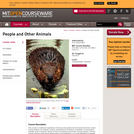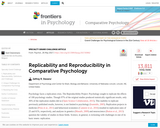
Students will research and present information about an animal.
- Subject:
- Educational Technology
- Zoology
- Material Type:
- Lesson Plan
- Author:
- Hannah Carpenter
- Date Added:
- 03/03/2019

Students will research and present information about an animal.

This is a notes sheet for animal research.

By the end of this section, you will be able to:Discuss the guiding principles of ethical researchDiscuss how research involving human subjects is regulatedSummarize the processes of informed consent and debriefingExplain how research involving animal subjects is regulated

This course is a historical exploration of the ways that people have interacted with their closest animal relatives, for example: hunting, domestication of livestock, exploitation of animal labor, scientific study of animals, display of exotic and performing animals, and pet-keeping. Themes include changing ideas about animal agency and intelligence, our moral obligations to animals, and the limits imposed on the use of animals. Students taking the graduate version complete additional assignments.

This course is a historical exploration of the ways that people have interacted with their closest animal relatives, for example: hunting, domestication of livestock, exploitation of animal labor, scientific study of animals, display of exotic and performing animals, and pet-keeping. Themes include changing ideas about animal agency and intelligence, our moral obligations to animals, and the limits imposed on the use of animals. Students taking the graduate version complete additional assignments.

Psychology is designed to meet scope and sequence requirements for the single-semester introduction to psychology course. The book offers a comprehensive treatment of core concepts, grounded in both classic studies and current and emerging research. The text also includes coverage of the DSM-5 in examinations of psychological disorders. Psychology incorporates discussions that reflect the diversity within the discipline, as well as the diversity of cultures and communities across the globe.Senior Contributing AuthorsRose M. Spielman, Formerly of Quinnipiac UniversityContributing AuthorsKathryn Dumper, Bainbridge State CollegeWilliam Jenkins, Mercer UniversityArlene Lacombe, Saint Joseph's UniversityMarilyn Lovett, Livingstone CollegeMarion Perlmutter, University of Michigan


By the end of this section, you will be able to:Discuss how research involving human subjects is regulatedSummarize the processes of informed consent and debriefingExplain how research involving animal subjects is regulated

This chapter covers:Why is Research Important?Approaches to ResearchAnalyzing FindingsEthicsFor more information, visit OpenStax College.

Replicability and Reproducibility in Comparative Psychology Psychology faces a replication crisis. The Reproducibility Project: Psychology sought to replicate the effects of 100 psychology studies. Though 97% of the original studies produced statistically significant results, only 36% of the replication studies did so (Open Science Collaboration, 2015). This inability to replicate previously published results, however, is not limited to psychology (Ioannidis, 2005). Replication projects in medicine (Prinz et al., 2011) and behavioral economics (Camerer et al., 2016) resulted in replication rates of 25 and 61%, respectively, and analyses in genetics (Munafò, 2009) and neuroscience (Button et al., 2013) question the validity of studies in those fields. Science, in general, is reckoning with challenges in one of its basic tenets: replication. Comparative psychology also faces the grand challenge of producing replicable research. Though social psychology has born the brunt of most of the critique regarding failed replications, comparative psychology suffers from some of the same problems faced by social psychology (e.g., small sample sizes). Yet, comparative psychology follows the methods of cognitive psychology by often using within-subjects designs, which may buffer it from replicability problems (Open Science Collaboration, 2015). In this Grand Challenge article, I explore the shared and unique challenges of and potential solutions for replication and reproducibility in comparative psychology.

This course is designed to provide graduate students and postdoctoral associates with techniques that enhance both validity and responsible conduct in scientific practice. Lectures present practical steps for developing skills in scientific research and are combined with discussion of cases. The course covers study design, preparation of proposals and manuscripts, peer review, authorship, use of humans and non-human animals in research, allegations of misconduct, and intellectual property. Also discussed are mentoring relationships and career options. Aspects of responsible research conduct are integrated into lectures and case discussion as appropriate to the specific topic. This course also satisfies the training grant requirements of the NIH for education in the responsible conduct of research.
Beginning in Spring 2004, this course will be titled “Survival Skills for Researchers: The Responsible Conduct of Research.”